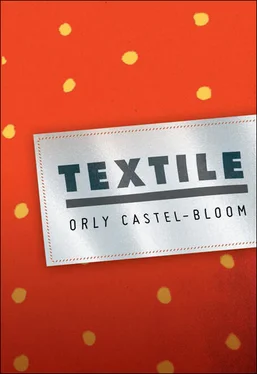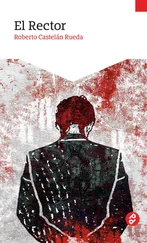DAEL HAD NO INTENTION of keeping this schmuck informed about any developments. The loathing between them was mutual. It had come to a head one Friday night the previous winter when Shlomi had done them the favor of showing up at the apartment in Telba-North, after Lirit had pressured him into it. Mandy had prepared a relatively festive meal. Usually she bought takeout from selected delis, but this time she surpassed herself and made a quiche and salads — all organic, without pesticides, chemicals, and genetic modifications.
Around the table they talked about Dael’s ambition to study to become a paparazzo abroad, and to photograph celebrities on the local scene in poses that up to now had never graced a camera. Shlomi argued that this was an invasion of privacy and Dael insisted that the minute someone was a celeb — his life was no longer his own business.
Lirit tried to change the subject, and asked those present if they had seen that a Michal Negrin boutique had been opened in Mikado. Mandy couldn’t stand the jewelry they sold at those shops and shut her daughter up, without any sensitivity to the diversionary tactics her offspring was attempting to put into play, with the result that Shlomi launched into an inflammatory speech against Tel Baruch North and its inhabitants.
Dael remarked that with all due respect to the saying that fresh eyes see every flaw, Shlomi didn’t know enough to form an opinion about any neighborhood North of the Yarkon River. But Shlomi insisted that it was enough to check out a few streets here in order to know what you were up against, and Dael replied (apparently in order to impress Aya Ben-Yaish, who was also present at the table, but who kept quiet, except for occasionally giggling shyly, or spitefully, who knows) that for someone who couldn’t stand the place or the people who lived there, he couldn’t seem to keep his hands off one of them, meaning Lirit.
Lirit and Mandy exchanged shocked looks. Irad Gruber didn’t bat an eye, and only when Mandy whispered to him that his autism was off the charts, he intervened and said, “Okay-okay, enough-enough-enough, everybody shut up.”
Later that evening, when they were putting the dishes in the dishwasher, one rinsing in the sink and the other arranging, the mother and daughter decided to refrain in future from inviting Shlomi and Dael to sit at the same table because there was an ideological chasm yawning between them. That same week Dael was sent on a mission to eliminate someone heavy, and he imagined Shlomi and hit right in the center of the wanted man’s body mass.
ON THE TRAIN to Tel Aviv Dael tried his father’s cell phone a few times too, but in the end he understood that perhaps he hadn’t taken it with him to America at all.
The person sitting opposite him was sucking air through his teeth, as if an obstinate crumb was stuck there and he was trying to suck it out. The noise he was making with his teeth got on Dael’s nerves, and he asked himself how he could approach him without insulting him. Every formulation that occurred to him was disqualified as soon as he imagined what he himself would feel if someone had addressed him in such a way in the middle of the train. He had a talent for stepping momentarily into somebody else’s shoes, which ostensibly seemed completely in contradiction to the fact that he was also an outstanding shot. But he never stepped into the shoes of the people he shot.
He moved to another seat and rang home again and met again and again with the answering machine, which said in Mandy’s voice, “You have reached the Gruber family: Amanda Gruber,” (yes, she jumped to the head of the queue), “Irad Gruber, Lirit Gruber and Dael Gruber. You may leave a message for any of these.”
Dael thought about the word “these.” She could have said “them,” or simply said nothing after the word “message,” but Mandy, who had arrived in Israel at the age of eight, still had a complex about not being a sabra, and took every opportunity to display her mastery of the Hebrew language.
He couldn’t understand what was happening to his sister. “Troubles never come singly,” his mother liked to say, and added “God forbid.” The possibility of his sister being in trouble horrified him, and he tried to remember the name of their neighbors, something like Rotterdam, but not actually Rotterdam. . He recalled his mother saying that she had doubts about their Jewishness because of their Flemish appearance, and he remembered that their name was Amsterdam.
He called information and wrote down their number on the beautiful bookmark he took out of The Red and the Black . The doubtful neighbors were diligent but not at all efficient. They rang and rang, knocked and knocked, called, “Lirit, Lirit,” but got no reply. They told Dael that they could hear the phone ringing in the triplex. Mr. Amsterdam suggested calling someone to break in, but Dael thanked him politely.
He put his gun down on the seat on his right, passed the strap over his head to his left shoulder, and buried his head in his hands.
He had never felt so guilty. If he hadn’t been doing this job in the army, his mother wouldn’t have gone in for plastic surgery and Lirit wouldn’t have had to come up north in order to take charge of the factory.
He raised his head and looked at the approaching lights of Lydda and decided to prioritize. His mother was in certain danger, and he would therefore concentrate on her and set the mystery of Lirit aside for the time being.
AMANDA GRUBER PASSED AWAY at five fifty in the morning, Israel time. An hour before Dr. Yagoda left his home in Dresden in order to spend the following days and nights recuperating on the banks of some lake or other. In any case, there was nothing he could have done. A virulent germ had attacked the area of the operation. Usually this germ was friendly, but in rare cases it became virulent and consumed the bones rapidly.
Dr. Atzmon Lidani, the intensive care doctor, didn’t tell Dael and Lirit (who, after she woke up, was located safe and sound at home) in so many words that their mother was turning into a boneless mollusk. They understood for themselves. Dr. Lidani only told the horrified children that the bacteria had attacked their mother at five different points, and that the stronger it became from devouring the bones the faster it worked. Dr. Lidani did all he could. The minute he admitted the patient to intensive care, he had drawn up a protocol of liquids for her and given her pulses of steroids and huge quantities of antibiotics. In the meantime he had located an international expert on the bacteria in question on the Internet, in the state of Virginia. He had found him on vacation in Miami, and proceeded according to his instructions.
“He’s number one in the world, and I hold him in very high esteem,” said Dr. Lidani to Mandy’s children, “Let’s pray that something takes.”
“We’ll cross our fingers,” said Lirit.
Mandy was no stammerer, and even though she disliked the Hebrew language, she knew how to speak it fluently and very well. But now she had great difficulty in speaking since the bacteria had attacked the bones of her face and jaw.
“Nothing left,” she said. “Not worth it. The elbows. The head. It’s in the skull. Enough. No towels in the Sheraton. All finished.”
Lirit couldn’t bear to hear her mother talking like this, in sober despair and at the same time not to the point. The combination made her uncomfortable. She wanted to remember her at her best, and she told Dael that she was going to the vending machine to fetch hot chocolate for him and coffee for herself.
On her way back with the two brown plastic glasses, she heard her mother shouting, “Ohhhhhhh,” threw both glasses out of the window in a panic, and ran into the room.
Читать дальше












